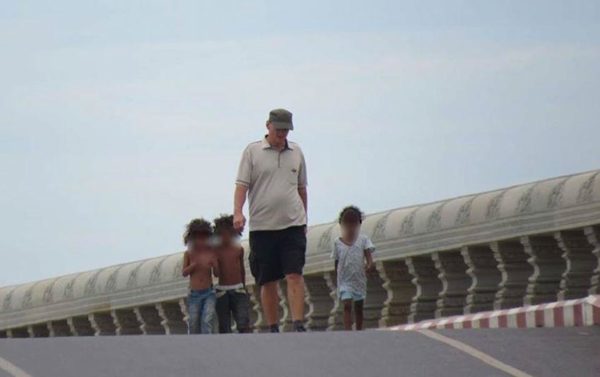The Cambodian Organisation that Stalks Western Child Molesters
July 19, 2017 · By SIMON HENDERSON AND PETER HOLSLIN for www.vice.com

Alleged child molester Michael Jones, photographed in 2014 by APLE. All photos courtesy of Action Pour Les Enfants
Rong Rattana was watching. Rattana, a Child Protection Coordinator for the Cambodian non-governmental organization Action Pour Les Enfants (APLE), had been on the American man’s trail after seeing him ride through the city of Siem Reap on a motorbike with a young Cambodian boy in tow. For months, Rattana and other APLE investigators followed the man.
He was living on the outskirts of town, in a $1.2 million [€1.1 million] home outfitted with a pool and a water slide. The man, Jack Sporich, was a retired engineer who’d moved to Cambodia from Arizona, after spending nine years in US prison and another three in a state hospital for molesting young boys.
APLE investigators put Sporich’s home under surveillance. They watched all day and saw three young Cambodian boys come and go. In interviews later detailed in court papers, the boys told APLE investigators that they called Sporich “dad.” He gave them money for school and let them play on his computer. They told APLE that he’d slept in the same bed with them, bathed with them, and in those moments, he would sometimes reach down and play with their genitals.
The Cambodian group’s investigation—a detailed account, which was outlined in a federal court complaint against Sporich filed in April 2009—led directly to Sporich’s arrest in Cambodia and deportation back to the United States to face charges in federal court. Last month, 81-year-old Sporich was sentenced to ten years in prison for molesting two of the boys. It was a major success for APLE.
APLE sits at the forefront of efforts to crack down on child sexual exploitation in Cambodia, and over the years has become well-known for its hardcore approach. Relying on a team of covert investigators and a web of informants, the organization is dedicated to hunting down Western tourists who for years have regarded Cambodia—one of Southeast Asia’s poorest countries—as a playground for hiring underage sex workers and sexually exploiting young children.
APLE’s efforts have led to numerous convictions and the rescue of hundreds of abused children. In the process, it’s become a key ally with the Cambodian police as well as with US Immigration and Customs Enforcement, an agency of the Department of Homeland Security that runs its own Child Exploitation Investigations Unit. But the group has also been dogged by online critics, some actively defending convicted or accused sex offenders they see as wrongfully jailed. And in recent months, criminal charges against a former APLE director suggest that cases like Sporich’s—as disturbing as they are—are just one part of a complex and deep-seated problem.
Cambodia is well-known as a destination for “sex tourism.” While many adult sex workers ply their trade willingly, the country has also been haunted by the history of red-light districts like Svay Pak, a village on the outskirts of the capital Phnom Penh where brothels openly pimped out girls as young as five, and a “virgin trade” drew the most corrupt local and foreign customers.
Abuses of children in Cambodia once flew under the radar in part because the government of Prime Minister Hun Sen was hampered by corruption and lack of resources. But efforts shifted in the mid-2000s as the government began working closely with countries like the United States and Australia, arresting and then deporting foreigners to face trial in their home countries. The United States stepped up its own efforts by passing a law, part of the Protect Act of 2003, which makes it illegal for citizens and permanent residents to engage in sex acts with minors while traveling in a foreign country—a crime punishable by up to 30 years in prison.
But none of these efforts would be nearly as effective were it not for APLE, which often sniffs out suspects before anybody else. The group, founded in 2003 by the French activist Thierry Darnaudet, has become immensely powerful. Though it operates relatively modestly (according to its financial statement for 2014, the organization had an annual income of $519,213 [€473,430] with outgoings of $491,834 [€448,414), the group works alongside American law enforcement, with the official blessing of Cambodia’s Ministry of the Interior (MoI). According to Samleang Seila, APLE’s president, a government-issued Memorandum of Understanding empowers the group to do its own preliminary investigative work to assist official authorities.






